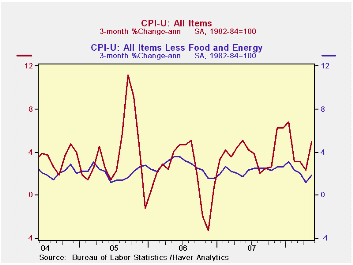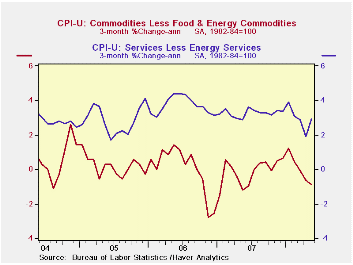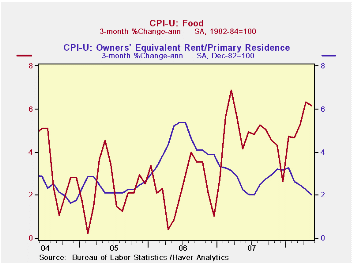 Global| Jun 13 2008
Global| Jun 13 2008U.S. Consumer Price Index Acceleration Driven by Energy
by:Tom Moeller
|in:Economy in Brief
Summary
The Bureau of Labor Statistics reported that the May consumer price index (CPI-U) rose 0.6%. The increase was the strongest since last November and it was slightly ahead of expectations for a 0.5% rise. Year-to-year, prices rose 4.1% [...]

The Bureau of Labor Statistics reported that the May consumer price index (CPI-U) rose 0.6%. The increase was the strongest since last November and it was slightly ahead of expectations for a 0.5% rise. Year-to-year, prices rose 4.1% but during the last three months the increase has been a faster 4.9%.
Energy prices surged 4.4% last month, the gain lifted by a 5.7% (20.8% y/y) seasonally adjusted jump in gasoline prices. (Not seasonally adjusted gasoline prices rose 9.5% m/m last month and are up another 6.4% so far in June.) Fuel oil prices more than doubled the April rise and increased 7.9% (50.7% y/y). Natural gas & electricity prices also were strong and rose 2.3% (8.8% y/y).
Food & beverage prices continued to rise and posted a 0.3% increase. The year-to-year increase was stable at a firm 5.0% which was the strongest since 1990, but the three-month rate of increase is an even firmer 5.9%. Prices for cereals & bakery products led last month's strength with a 1.6% (10.5% y/y) jump. Other food prices were under control. Prices for meats poultry & fish rose 0.1% (2.6% y/y) after a 0.9% April increase. Dairy product prices also cooled and fell 0.1% after the 1.2% spike during April. Prices still were up 11.0% y/y.
Less food & energy, consumer prices matched expectations and increased 0.2% during May after a 0.1% April uptick. During the last three months this inflation measure rose at a 1.8% annual rate, down from the 2.3% gain last year
Core goods prices fell 0.1% after having been unchanged in April. The three-month rate of decline of 0.9% was the weakest showing for core prices since May of last year. Prices for new & used motor vehicles fell 0.1% and declined at a 1.5% rate during the last three months. Apparel prices also were weak. They declined 0.3% and fell at a 4.3% annual rate during the last three months. Prices for household furnishings & operations rose just 0.2% but lately have shown some strength. They posted a 2.7% gain during the last three months versus a 0.1% decline during all of last year.
Core services prices firmed last month and posted 0.3% increase which was the largest rise since January. The strength was led by a 2.3% (10.2% y/y) surge in public transportation prices. Medical care services prices also rose a strong 0.5% (4.7% y/y). Still tame were shelter prices which rose 0.2% (2.6% y/y). Owners equivalent rent of primary residence, a measure not equivalent to other house price measures, rose 0.1% (2.6% y/y) and rents rose 0.2% (3.5% y/y). Education costs rose another 0.4% and here prices rose at an accelerated 4.2% rate during the last three months following a 2.4% rise during 2007.
The chained CPI, which adjusts for shifts in consumption patterns, rose 0.6% which was near the April increase. Less food and beverages chained prices were unchanged.
Does stabilizing inflation contribute to stabilizing economic activity? is a speech by Fed Governor Frederic S. Mishkin and it can be found here.
| Consumer Price Index (%) | May | April | March | May Y/Y | 2007 | 2006 | 2005 |
|---|---|---|---|---|---|---|---|
| Total | 0.6 | 0.2 | 0.3 | 4.1 | 2.9 | 3.2 | 3.4 |
| Total less Food & Energy | 0.2 | 0.1 | 0.2 | 2.3 | 2.3 | 2.5 | 2.2 |
| Goods less Food & Energy | -0.1 | 0.0 | -0.1 | 0.1 | -0.4 | 0.2 | 0.5 |
| Services less Energy | 0.3 | 0.1 | 0.2 | 3.2 | 3.4 | 3.4 | 2.8 |
| Energy | 4.4 | -0.0 | 1.9 | 16.9 | 5.6 | 11.0 | 17.0 |
| Food & Beverages | 0.3 | 0.9 | 0.2 | 5.0 | 4.0 | 2.3 | 2.5 |
| Chained CPI: Total (NSA) | 0.6 | 0.5 | 0.8 | 3.6 | 2.5 | 2.9 | 2.9 |
| Total less Food & Energy | 0.0 | 0.1 | 0.5 | 2.0 | 2.0 | 2.2 | 1.9 |
Tom Moeller
AuthorMore in Author Profile »Prior to joining Haver Analytics in 2000, Mr. Moeller worked as the Economist at Chancellor Capital Management from 1985 to 1999. There, he developed comprehensive economic forecasts and interpreted economic data for equity and fixed income portfolio managers. Also at Chancellor, Mr. Moeller worked as an equity analyst and was responsible for researching and rating companies in the economically sensitive automobile and housing industries for investment in Chancellor’s equity portfolio. Prior to joining Chancellor, Mr. Moeller was an Economist at Citibank from 1979 to 1984. He also analyzed pricing behavior in the metals industry for the Council on Wage and Price Stability in Washington, D.C. In 1999, Mr. Moeller received the award for most accurate forecast from the Forecasters' Club of New York. From 1990 to 1992 he was President of the New York Association for Business Economists. Mr. Moeller earned an M.B.A. in Finance from Fordham University, where he graduated in 1987. He holds a Bachelor of Arts in Economics from George Washington University.
More Economy in Brief
 Global| Feb 05 2026
Global| Feb 05 2026Charts of the Week: Balanced Policy, Resilient Data and AI Narratives
by:Andrew Cates






